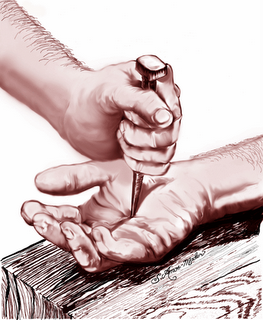Accepting these objecive moral norms is one thing, ordering our lives in accord with the truth is another. The latter being far more difficult and frustrating than the former. The difficulty and frustration we experience when seeking to order our lives according to objective moral norms leads us to periodic reconsideration of these norms. Such a movement, even at times when we may try to reject or ignore the claim of the truth on us, if we do not give up on God, leads us deeper into the truth. Grace, as Bonhoeffer pointed out, does not come cheaply.
Part of the solution to this disjunction lays with accepting objective moral norms out of love; love of God and love of neighbor and not merely seeing them as externally imposed rules. If living the truth amounts to nothing more than trying to live by imposed rules- white-knuckle obediance- we will fail and perhaps just give up and try to find fulfillment elsewhere. The biggest realization we have to arrive at in order to live our lives in accordance with the truth is the realization that the Truth, as well as the Way, is a person, Jesus Christ. Knowing and loving Jesus Christ is what leads us to live our lives in accord with the truth because in the same way we seek to please others we love, we want to please the Lord. As Jesus tells his disciples, "If you keep my commandments, you will abide in my love, just as I have kept my Father's commandments and abide in his love" (Jn 15,10) and, more directly, "If you love me, you will keep my commandments." (Jn 14,15) Every, single objective moral norm boils down to loving God with all our heart, might, mind, and strength and our neighbor as ourselves (Lk 10,27). The first step in coming to know Jesus Christ is coming to the realization that we need a Savior. This means facing the difficult truth about ourselves. It means recognizing our faults, weaknesses, and vulnerabilities, our brokenness.
Conversion is on-going, it is not usually accomplished in a lightening flash. Even after we come to know and love Christ and consciously set about following him, like St. Paul, we experience in our bodies "another law at war with the law of [our minds]." This law of sin, at war with the law of God, that we have received and accepted, makes us captives (Rom 7,23) . Therefore, we must have the patience to grow grace by grace, allowing the Truth to free us, to liberate us from all that holds us captive and prevents us from realizing the end for which we are created, communio. As the Holy Father wrote in his encyclical Deus Caritas Est, "Being Christian is not the result of an ethical choice or a lofty idea, but the encounter with an event, a person, which gives life a new horizon and a decisive direction." For most of us, the movement of grace is driven by the cycle of sin and forgiveness; when we are weak, then we are strong, as God's strength is made known to us through our weakness (2 Cor 12,6-10). On this Friday, remember that your name is written on the palm of His hand.

Binding consciences is a serious business. Too often, the Church, in seeking to bind consciences, puts too much emphasis on human effort. Furthermore, in recent years, in the wake of the child sex abuse fiasco, that has lead to a diminishment of credibility, what Jesus says of the Pharisees seems all too fitting: "The scribes and the Pharisees sit on Moses' seat; therefore, do whatever they teach you and follow it; but do not do as they do, for they do not practice what they teach. They tie up heavy burdens, hard to bear, and lay them on the shoulders of others; but they themselves are unwilling to lift a finger to move them" (Matt 23,2-4).


No comments:
Post a Comment